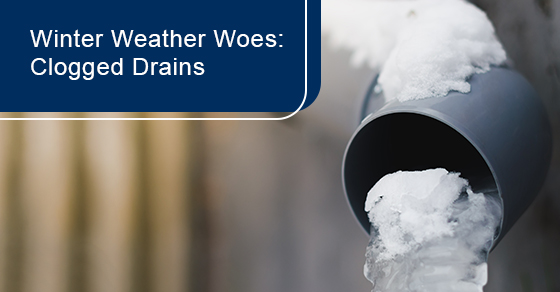Winter Weather Woes: Clogged Drains

As the temperatures drop, most of us end up spending more time inside. While we’re happily enjoying the warmth of home, however, the cold can still make our lives difficult. Winter plumbing woes are a serious obstacle during the colder months. One common problem that you may encounter is a pesky cold-weather clog.
What Happens to Your Plumbing System in Winter
Winter often unleashes an assortment of plumbing problems. There are several reasons for this.
First, cold temperatures frequently wreak havoc on your home’s pipes. Sub-freezing temperatures can freeze the water within the plumbing system, which can then lead to blockages and bursts.
Second, most households spend more time indoors during the winter months. As a result, water consumption increases, placing additional strain on pipes, water heaters, and drains. Then, there are the holidays to consider. All that extra cooking is hard on your home’s plumbing.
Third, those frigid temperatures can worsen minor blockages and clogs. Pipes inevitably collect debris over time, but when the cold weather hits, these blockages stiffen and solidify.
The grease, food scraps, soap scum, residue from personal care products, and hair that have made their way down the drain over the summer and autumn turn into an unmovable mass stuck in the pipes.
The Types of Cold Weather Clogs
1. Bathroom drain pipe clogs
Clogs can develop any time of year if you let the wrong things go down your drains. Hair, soap scum, and other residue build up on the walls of the pipes until nothing else can get through. When this happens, you have a clog—and a problem. That being said, the risk of a clog is higher during the colder months.
In cold temperatures, all that residue in your pipes begins to stiffen and consolidate. Pretty soon, it becomes a clog.
2. Kitchen grease woes
You should never pour grease or oil down the kitchen sink. It doesn’t matter how monumental the pile of dishes is after a holiday feast or how desperately you want to expedite the cleaning process; washing grease down the sink is never worth it.
While you may be able to avoid disaster in the summer, this bad habit will get you into a lot of trouble as soon as the cold weather hits.
Hot oil and grease naturally stick to the sides of your plumbing, which is why pouring it down the sink is such a bad idea. In cold weather, the oil and grease cool down faster in the pipes. It stiffens and congeals. A solidified layer of fat forms, eventually causing a nasty blockage.
3. Frozen pipes
Sometimes, a drain won’t function because there is an ice blockage within the pipes. Frozen pipes are a common winter issue, particularly if the pipes within your home are improperly insulated.
If this happens, however, a clogged drain may be the least of your worries. Frozen pipes can actually burst, inflicting serious water damage on your home. You may experience a flood, a significant leak, and eventual mould or mildew growth.
4. Vent pipe clogs
The sewer gases in your home’s drain pipes are vented to the outside via the vent pipes, which also allow fresh air into the pipes. Over the winter, ice can build up within the vent pipes and cause a clog.
when this happens, the drains that are connected to the blocked pipes will appear clogged. The drain may behave as if it is entirely blocked, or you may notice a slow drain.
How to Prevent Cold Water Clogs
- Locate the pipes in your home that are vulnerable to freezing. For example, unfinished attics and basements are often poorly insulated (if they’re insulated at all). Any pipes in these areas are more likely to freeze. By adding insulation, you can prevent frozen pipes.
- Never pour grease or oil down the drain. Instead, collect these liquids in a container and then dispose of them properly.
- It’s nearly impossible to keep all clog-forming substances out of your pipes. This winter, evaluate the likelihood of drain pipe clogs in the kitchen and bathroom from hair, food particles, and other types of residue.
If you already have a slow drain before winter even begins, address it immediately. That minor blockage will only get worse once the temperatures drop. - Identify your home’s vent pipes. If ice builds up in these pipes, you may encounter a clog. Take steps to keep the vent pipes free of ice so fresh air can flow through your home’s plumbing system.
- Keep your home warm. A consistently warm interior can actually have a significant impact on the condition of your pipes this winter.
A toasty environment discourages the build-up of ice and helps prevent minor clogs from getting worse with the cold.
What to Do if You Have a Cold Weather Clog
- Pour boiling water down the drain—carefully! In some cases, this is enough to thaw whatever is blocking the pipes.
- If you suspect that a pipe is frozen, do not use a blowtorch or any open flame. Instead, use a hairdryer, or wrap the pipe with a towel that has been soaked in boiling water to thaw the pipe slowly.
- Call your plumber. There’s a good chance that you won’t be able to fix your clogged drain by yourself. If pouring hot water down the drain doesn’t work, then you need professional help. Your plumber will be able to diagnose the issue, locate the clogs, and fix the problem.
Professional Drain Services in Toronto
The technicians at Brothers Plumbing in Toronto are your local drain experts. There’s nothing we haven’t seen before. No matter the kind of drain issue that you’re experiencing, Brothers Plumbing can help. We provide world-class drain cleaning!
For drain services in Toronto, call Brothers Plumbing at 800-741-8471 or contact us here.
Posted By Brothers Plumbing
0 Comment
